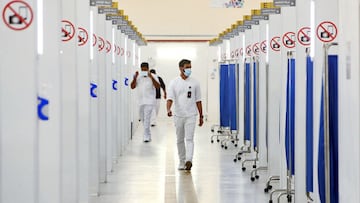How old do you have to be to get on Medicare?
The Medicare open enrollment period for 2022 has begun and all those sixty-five and older as leaders on Capitol Hill lowering eligibility to sixty.


At sixty-five seniors eligible to receive Social Security benefits are automatically enrolled in Medicare Parts A and B.
There are three major “Parts” of Medicare:
What are the various 'Parts' of Medicare?
- Part A: which covers hospital stays, skilled nursing, and hospice services;
- Part B: which covers outpatient services, most doctors visits, and most drugs that need to be administered by medical professionals; and
- Part D: which covers most “self-administered” prescriptions.
Some seniors elect to add additional coverage for things like vision and dental through a Part C or Medicare Advantage plan.
Each year, Medicare members are able to purchase supplemental plans, Parts C and D, which enhance coverage.
Part C includes Medicare Advantage Plans which expand coverage by providing dental, vision, hearing, and other benefits, which are excluded from Parts A and B. Additionally, members looking to bring down the cost of prescription drugs are able to purchase Part D plans.
What are Medicare Parts C and D and how many people are enrolled?
Around a third of Medicare members are enrolled in an Advantage Plan. Since its inception, the number of members who purchase Part C plans has increased.
A survey conducted by the Center for Health Care Strategies found that costs were the highest barrier for low-income seniors in accessing dental coverage. To solve this problem, Progressive Democrats have included pushing to expand Medicare to cover dental, vision, and hearing needs. To appeal to voters, Senator Bernie Sanders took to social media saying: "Keeping your teeth in your mouth as you grow old should not be a luxury."
Keeping teeth in your mouth as you grow old should not be a luxury in this country.
— Bernie Sanders (@BernieSanders) October 24, 2021
With only around thirty percent of seniors having access to dental insurance, many seniors suffer from dental diseases that leave many toothless in their old age. The Centers for Disease Control and Prevention published data that shows that "nearly a fifth of those over sixty-five have lost all of their teeth." Twice as many Black beneficiaries have lost all their teeth compared to the national average.
Medicare Part D, passed in the early 2000s, allowed insurance companies to offer plans to help bring down the costs of prescription drugs. This change to the structure of the program was especially important for seniors with chronic conditions that require a high number of medications, or particular drugs that can be very costly. In 2021, 42 million of the more than 62 million Medicare members were enrolled in a Part D plan, showing that many seniors struggle to cover the cost of prescriptions.
A push to lower the eligibility age and expand services covered by Medicare
For a growing percentage of the population born after 1960, the retirement age has been increased to sixty-seven based on a law passed in the 1980s. To receive the maximum benefit for the number of years one has worked, they will have to wait until sixty-seven to retire. However, already many workers who must wait until sixty-five to receive the highest possible benefit chose to leave the workforce early.
This choice can create challenges when it comes to healthcare as they are no longer covered by the employer and often find that the plans on the healthcare market are far too expensive based on their retirement incomes. As the retirement age increases this will become a larger problem should more people choose to retire before sixty-five when their Medicare benefits would kick in.
8/ (f) Lowering the Medicare eligibility age to 60. (Fact: cancer diagnoses spike at 65, not because cancer rates go up but because of how many people have gaps in health coverage until they become Medicare-eligible.)
— Sean Casten (@SeanCasten) October 3, 2021
This period between retirement and when Medicare benefits kick in is known as the Medicare gap. The gap, like the cost of Part C and D plans, has a high health cost. When many fall into the Medicare gap, they forgo check-ups until they are eligible. Studies have shown that at age sixty-five more people are diagnosed with cancer, which can be fatal because they did not undergo preventative screenings when they were in the coverage gap.
As a part of the reconciliation bill, some Democrats are pushing for a measure that would lower the Medicare eligibility age to sixty to eliminate these issues. By lowering the eligibility age, Congress would allow seniors greater flexibility and allow them to make a choice on when to retire that is not solely based on the additional costs of healthcare.
There are other benefits to making this change. Older people tend to cost more to insure as they tend to have more health problems as they age. By removing them from the healthcare pool, costs could be brought down as the overall age of the pool would be lower.
Related stories
Additionally, Democrats had initially included funding to expand Medicare to cover dental, hearing, and vision services but these may items may be cut to bring down the price tag. In order for the reconciliation bill to pass, all Democratic Senators must vote in favor. Currently, two, Joe Manchin of West Virginia and Kyrsten Sinema of Arizona have said they will not support a proposal valued at $3.5 trillion.
The outstanding issues have become clear:
— Leigh Ann Caldwell (@LACaldwellDC) October 26, 2021
- 4 weeks paid leave (Manchin opposes)
- Medicare vouchers for dental (Manchin opposes)
- Medicaid expansion (Manchin opposes)
- Rx drug pricing (Sinema opposes)
- And how to pay for ithttps://t.co/FYzFTWlffZ
The White House has reported on negotiations with these Senators and white they seem to be making progress, it is at the expense of measures like the two listed above.
